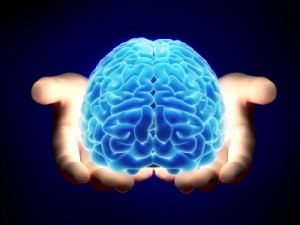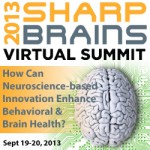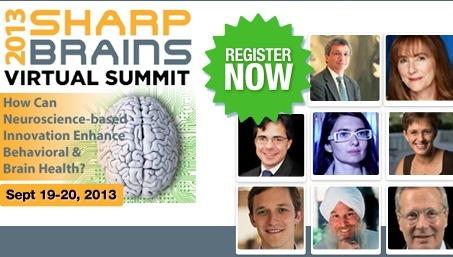Where Brain Health Meets Digital Health and Big Data
 2013 is an exciting time to have a brain. Over the past two decades, our understanding of the human brain has grown exponentially. Fueled by this new information, the number and variety of brain applications available commercially is exploding, potentially transforming the way we care for our brains across our entire lifespan.
2013 is an exciting time to have a brain. Over the past two decades, our understanding of the human brain has grown exponentially. Fueled by this new information, the number and variety of brain applications available commercially is exploding, potentially transforming the way we care for our brains across our entire lifespan.
Having a brain is not a medical condition, yet in practice that seems to be our unspoken assumption. The truly revolutionary and often untold story these days is about the tools becoming available to consumers to take better care of their own brain health and performance, thanks to new digital platforms that can access large quantities of data. This trend can take brain health (and health overall) to a whole new level, away from its traditional overemphasis on a constellation of medical conditions, pharmacological interventions and small clinical trials.
While neurological and psychological conditions take a terrible toll on society, from ADHD to depression and Alzheimer’s Disease, it is time for a new paradigm that doesn’t address each of them in isolation. True Brain Health requires preserving and enhancing a variety of cognitive, emotional and executive functionality, going far beyond the absence of disease. A holistic Brain Health approach, additionally, would serve as the best way to delay, if not prevent, the neurological and psychological conditions mentioned above.
This opportunity is becoming true thanks to a nascent cultural shift. Previously a passive party in the healthcare process, consumers are assuming a more active role. According to SharpBrains’ 2013 market report, consumers have surpassed health care and insurance providers to become the driving force behind brain health innovation. We are seeing an increased awareness making brain health and fitness a priority for society at large, not just those affected by particular disorders. For example, adults of all ages are taking proactive care of their “brain fitness,” and employers are investing in corporate wellness initiatives that target both body and brain, in an effort to increase the resilience and performance of their leaders and whole workforce.
And consider the broader trends highlighting the importance of physical fitness and empowering consumers and patients to take care of their own health. What can be more important in taking care of one’s body than taking care of one’s brain? Since we don’t see this crucial organ in the mirror, it’s all too easy to forget those billions of neurons and connections. But the research picture is increasingly clear … what we do, every single day, has an impact on our brain health. For better or worse, our choices and behaviors impact our lifelong brain development, and the way we treat our brain today will affect our overall health and quality of life years from now.
Empowering everyone with a brain to optimize that brain will require widespread access to validated assessments and interventions as well as a well-informed understanding of how to navigate and use them. We are still early in this process, but we should be aware that accelerating innovation is poised to enable systematic brain health self-monitoring and self-care, in turn transforming what it means to live healthy and fulfilling lives. The proliferation of inexpensive, data-rich technologies means more individuals will start to measure and track mental functions over time, gaining insights into brain changes, and better guiding self-care efforts. This also means that health providers will face new opportunities, and challenges.
It is exciting to imagine the possibilities at the intersection of Brain Health, Digital Health and Big Data, but getting there requires addressing immediate questions confronting us today:
- How can we harness large new brain research initiatives to maximize their future health and well-being benefits?
- How can organizations maximize the resilience and productivity of their human resources?
- What is the future of personal brain health, and how can Big Data help upgrade brain care?
- How can practitioners integrate emerging neuroplasticity-based interventions with existing standards of care?
- What are future consumer applications of bio-sensing neurotechnology?
 These are precisely the type of questions that over a hundred pioneers at the frontier of Brain Health and Digital Innovation will be discussing later this week at the 2013 SharpBrains Virtual Summit (September 19–20th), chaired by 8 trailblazers named Young Global Leaders by the World Economic Forum, bringing together diverse perspectives from the worlds of science, medicine, technology, and business to pool efforts across traditional silos.
These are precisely the type of questions that over a hundred pioneers at the frontier of Brain Health and Digital Innovation will be discussing later this week at the 2013 SharpBrains Virtual Summit (September 19–20th), chaired by 8 trailblazers named Young Global Leaders by the World Economic Forum, bringing together diverse perspectives from the worlds of science, medicine, technology, and business to pool efforts across traditional silos.
While there is much we still do not know about our brains, we do know that the status quo is not an option. It is leaving us woefully unprepared to meet current and future demands. We also know that whatever unfolds will inevitably impact each and every one of us on a very intimate level. You can’t get any more personal than your own brain. Thus, it really is up to all of us to participate in this growing transformation as individuals and professionals. After all, what better way to improve our brains than to understand and apply the latest science and technology to enhance our organizations and ourselves?



